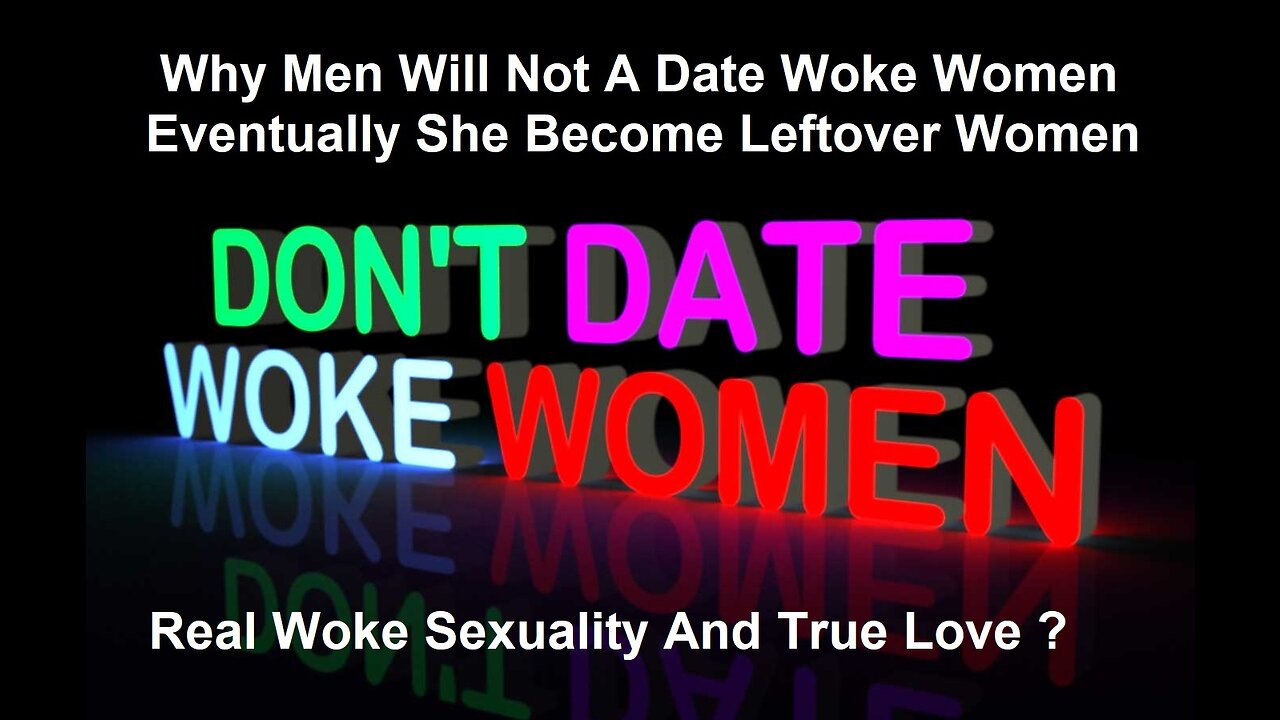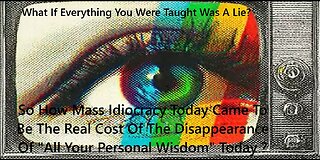Premium Only Content

Why Men Will Not Date Woke Women And Eventually She Become Leftover Women
Why Men Won't Date Woke Women! Why Woke Women Will Eventually Become 'Single Leftover Women' Many men find dating woke women to be difficult and off putting. Its not that there is anything wrong with certain points of view, its more when that point view gets in the way of the relationship.
The Dangerous Rise Of Men Who Won’t Date “Woke” Women ? The word "irrespective" means saying or doing something without taking anything else into account. For example: "Irrespective of the fact that the cost of living has jumped, putting pressure on many people, the government ploughed on with Brexit and argued that there would be no real economic impact."
So it is fitting that white man of the moment, Laurence Fox – who appeared on the BBC’s Question Time programme and told a BAME audience member that Meghan Markle has not been on the receiving end of racism before subsequently appearing on the cover of The Sunday Times to tell the world that he does not "date woke women" and then displaying an appalling understanding of history by calling the inclusion of a Sikh soldier in Sam Mendes' film 1917 "incongruous" – has "irrespective" tattooed on his arm.
Did you hear that at the back, ladies? Laurence Fox – who you perhaps only knew as Billie Piper’s ex-husband because you’ve never seen Lewis (what?) – does not date "woke" women who he believes are being taught that they are "victims", irrespective of whether they are right or not. He thinks that it’s "institutionally racist" to tell the story of the First World War in a racially diverse way, irrespective of the fact that Sikh soldiers absolutely fought for Britain. And he also doesn’t believe in white privilege, irrespective of the fact that he works in a painfully undiverse industry, was privately educated and comes from a wealthy acting family which is nothing short of a dynasty.
Fox is denying racism and sexism, irrespective of whether or not they exist. It’s nothing short of gaslighting. It’s all very Donald Trump. And as you would expect, the whole debacle has lit a fire under anti-woke poster boy Piers Morgan while gaining Fox thousands of extra Twitter followers.
I could go over all the things he’s said; I could use data to prove how wrong he is; I could express concern for his mental health (after all, who really enjoys arguing on Twitter?); I could make jokes about his behaviour. But all of that would be to seriously miss the point.
There’s nothing funny about the things Fox – or Wokey McWokeface as he now wants to be known – is saying. It’s also not particularly sad. It’s dangerous. He is just one very privileged man, and as a result of said privilege, has been given a platform. And he has used that platform to legitimise a bigger backlash against diversity and progress which is unfolding every single day in less public corners of the internet.
Not wanting to date "woke" women, far from being laughable, is actually one of the more insidious aspects of it. Spend an afternoon on any major dating app and you’ll come across (generally white) men saying openly sexist and misogynistic things. They might say "no psychos" or that they "fucking hate big eyebrows" in their bios. And, by and large, they also tend to hold extremely right-wing views and see themselves as victims of liberal thinking.
In fact, as I was writing this, a dear friend sent me a screenshot of a guy she’s just matched with who describes Jordan B Peterson as his "dream dinner guest". Yes, the same Jordan B Peterson who thinks that white privilege is a "Marxist lie" and wants millennials to drop their obsession with "social justice".
I, meanwhile, recently had to block someone who after matching with me launched into a vile rant about how women are "evil", "only want sex" and treat men as though they are "disposable". When I asked him if he hated women he replied that he had "only moderate disdain" for us before asking me whether I didn’t want to date him because I’m actually "pretty rough".
All of this, of course, speaks not only to the presence of the very active online communities of anti-feminist incels but to the prevalence of the hideous and incorrect ideas they promote. It doesn’t take magical thinking to see how men are radicalised by anti-feminism. As the saying goes: "When you’re used to privilege, equality feels like oppression."
The reactionary influence of these ideas doesn’t stop at dating, though. As the campaign group Hope Not Hate reported last year, a hostility towards feminism is feeding directly into far-right movements online. They found that a third of young British people today believe that feminism is marginalising or demonising men and warned that these beliefs were a "slip road" to other far-right ideas.
This isn’t just speculation. We know that the number of far-right referrals to the British government’s deradicalisation scheme Prevent has dramatically increased recently. In the year from 2017/18 they jumped by 36%, while referrals for Islamism actually decreased by 14%.
Right now, Laurence Fox, whether he realises it or not, has just landed the biggest part of his life. He is legitimising hatred and division. And yet he cannot be completely unaware of the role he plays; he has spoken about being "radicalised" himself on YouTube.
Last year he released an album called A Grief Observed which is largely about his acrimonious split from Piper. When The Times interviewed him about it he turned up wearing a pro-Donald Trump MAGA (Make America Great Again) cap and said it was a "social experiment". He then told the interviewer that he spent a lot of his time watching YouTube interviews which had "totally radicalised" him and caused him to embark on a "crusade against woke culture and political correctness." He wanted, he said, to call one of the songs "Me Too" but was prevented by his record label.
Fox is a case in point that what might start as playing devil’s advocate by wandering the streets in a MAGA cap to provoke "hipsters" can quickly turn into something more sinister.
The far right itself can be difficult to pin down because it isn’t exactly a coherent global movement with a concrete set of ideas. It largely exists online, in Facebook groups, as Twitter accounts, on YouTube and anonymous message boards such as 8chan. But every now and then, their bile spills out dangerously into the offline world.
In 2016 the Labour MP Jo Cox was murdered by far-right terrorist Thomas Mair who, 25 years before he killed her, told a far-right magazine that the "white race" faced a long and very bloody struggle. And it was 8chan that hosted the manifestos of three mass shooters who killed scores of people last year: the El Paso shooter (who left 20 people dead and many more wounded only a couple of weeks ago), the Poway shooter (who opened fire at a synagogue in California last April) and the Christchurch shooter (who killed 51 people at two mosques in New Zealand last March).
Susan Faludi wrote about the link between violence, anger and anti-feminism prophetically in her book Backlash: The Undeclared War Against American Women back in 1991. Long before the turbulent times which have seen the rise to power of two male caricatures – Donald Trump to the office of US president and the accession of Boris Johnson as our prime minister – she warned:
"When an attack on home soil causes cultural paroxysms that have nothing to do with the attack, when we respond to real threats to our nation by distrusting ourselves with imagined threats to femininity and family life, when we invest our leaders with a cartoon masculinity and require of them bluster in lieu of a capacity for rational calculation, and when we blame our frailty in ‘fifth column’ feminists – in short, when we base our security on a mythical male strength that can only increase itself against a mythical female weakness – we should know that we are exhibiting the symptoms of a lethal, albeit curable, cultural affliction."
She added: "When the enemy has no face, society will invent one." For men like Fox, who feel they have been wronged somehow, that they are missing out on opportunities because, for once in history, they are being given to other people, women and people of colour become the enemy.
You can see it in the abuse and threats received by women MPs and in the wildly different treatment of Meghan Markle and Kate Middleton. While Middleton, who generally keeps herself to herself and says little, has become a pinup heroine for traditionalists, Markle, who has spoken openly about sexism and racism, trying to use her platform for good, has been – quite literally – driven out of the country, condemned for being an outspoken snowflake.
Make no mistake, the far right is already capitalising on Fox’s words, gassing him up and turning him into an icon. He has added to their backlash and given it oxygen. Every time he is invited onto a TV or radio show to talk about it, that oxygen will cause the backlash to burn hotter and faster, irrespective of whether we’re watching or not. It’s important not to trivialise this anti-woke, anti-women backlash. In the end, it’s only by paying attention to it that we can understand it and do something about it.
Woke Sexuality It has become common to speak of a plurality of sexes, with new ones being discovered all the time. But loose talk of free choice of sexual identity in such domains as Facebook hides the real crux of woke sexuality, which has nothing to do with free choice.
Although feminism was the most universally grounded of the ascriptive liberation movements that have marked our history since the turn of the twentieth century—it has become difficult to conceive that at that time virtually no women anywhere were allowed to vote—woke institutions have made it clear that the interests of women as a biological group must take second place to the principle of gender self-definition. Women who resist this principle, for example in rejecting the idea of males “identifying” as women on girls’ sports teams or in ladies’ shower rooms, are not only reviled as TERFs**, but our purportedly conservative Supreme Court has recoiled at the idea of imposing the constitutionality of biological sexual difference.
The idea that there are as many genders as we can think to invent is one of those unanticipated yet seemingly inevitable consequences of libertarian modernity—an easy idea to entertain, since it has no real consequences beyond one’s profile on Tinder. Likewise, “gender fluidity” remains a behavioral concept that as far as I know has not led to contestation of legal rights. In contrast, wokeness imposes a binary choice: not of sex, but of gender, which is most simply defined as the sex of one’s soul.
The woke assert the rights of the transgendered over the cisgendered even at their most dubious—can transgendered boys not be aware of their advantages in competing against girls? In contrast with the social nature of racial distinctions, the principle, not of sexual choice, but of fidelity to one’s true sexuality, entails the denial, within the human community, of the most clearly biologically defined distinction of all: that between male and female.
The originary moral model is one of unanimous reciprocity, the in principle unlimited exchange of signs that are all instances of the same sign. It is against this configuration that all examples of firstness can be seen as oppressive. Normality, in contrast, excludes unanimity of this sort; it is an ethical conception that sets different norms for different classes of people, the most fundamental classification of all being once more that between male and female.
In principle, the ethical notion of the normal is a negative one, defining the limits of specific behaviors beyond which they become subject to complaint or stigmatization. Modernity has tested many of these limits, those of acceptable dress, for example; but even permissiveness in the acceptance of traditionally deviant conduct such as homosexuality had never previously required overt denial of biological reality, to the point where even scientists are forbidden to make hard and fast distinctions between the two sexes.
Until not long ago, homosexual activities were classified as crimes, although widely tolerated in private. The decriminalization of such activities has taken place in the context of a broadening conception of human rights that is reluctant to stigmatize “victimless crimes.” But the real turning point in the notion of normality that contributed to the tide of wokeism cannot simply be described as an increase in tolerance, and certainly not as a consequence of Millian liberalism in the sense that the individual should be free to do anything whatever provided it does not impact someone else; e.g., “the liberty of your fist ends at my nose.” On the contrary, the watershed occurred not in the domain of ethics but in that of human nature.
The traditional reason for stigmatizing homosexuality was that it was unnatural. Even among the Greeks it was common to mock those who were particularly predisposed to homosexual practices, and in particular, those adults (erastes) who were given to taking the passive role in their relations with their adolescent eromenos. I believe the homosexual practices associated with British public schools led to similar distinctions. The important point in such cases was the “objective” naturalness of the practice itself, not its naturalness with respect to the particular individual involved.
Thus, until the modern psychiatric era, and despite general awareness that some people were more attracted to these practices than others, the notion of the homosexual was not distinguished from practitioners of other vices such as being a habitual gambler, a drunkard, a compulsive seducer… In a word, homosexuality was seen as a vice, a trait de caractère, but not a fundamental category of human being, a “third sex” analogous to the two biological sexes.
The postwar decriminalization of homosexual activity was first understood in this minimally Millian sense: such activity harms no one, or in any case, no one beyond the “consenting adults” who engage in it, so it’s really not the society’s business. On the surface, this would seem to be the consistent liberal position; and I am fairly certain that when the laws criminalizing the practice were repealed, that was how the legislators and judges—and the homosexuals themselves—understood it. This is not to say that there was not a general conviction that engaging in such practices was “perverse” or abnormal, but such abnormality was no longer considered a reason to make it illegal. This was a triumph of classical liberalism.
We should note that nothing in this liberal stance suggests the possibility of a right to homosexual marriage. This emerged as the result of the efforts of activists in the homosexual community to in effect abolish the age-old category of “vice” as an activity that is stigmatized without being declared illegal. To argue over the extent to which this abolition is inherent in liberalism exemplifies the irrelevance of philosophizing that purports to find in the “inherent” meaning of words the answer to all moral problems. If one is a liberal, one must conclude….
I rather doubt that John Locke or J. Stuart Mill ever thought about homosexual marriage (an online article, https://polsci101.wordpress.com/2009/12/07/mills-view-on-homosexuality/ attempts to extrapolate a Millian perspective on the question), given that it impacts the Burkean social unconscious rather than the legal realm. It is certainly of historical interest that activities generally considered vices were tolerated in certain societies but forbidden in others. But in the contemporary world, the sea change has taken place not so much in the realm of morality as in that of our concept of human nature. Once homosexuality was no longer a crime, the contemporary mind was open to the idea that the category of “vice” itself was no longer legitimate. If an activity was not considered illegal in the sense of doing harm to non-consenting others, then one could no longer make any distinction between our right to practice it and other forms of private activity.
This would still not suffice to justify homosexual marriage. What was insisted on by its proponents was that homosexual desire differed only in its object from heterosexual desire, that the couples it brought together were not merely the equivalent of married couples, but that the society must recognize such unions as marriages tout court.
The important point here is the exact opposite of the liberal argument; it has nothing to do with permitting sexual freedom. On the contrary, the point is that because homosexual desire is as natural to some people as heterosexual desire is to others, these two natural tropisms should be accorded the same degree of cultural validity. Those homosexuals who would go yet farther and justify pedophilia (“man-boy love”) have remained marginalized. But once it became generally understood that the social purpose of marriage is not to carry on the reproduction of the race, but to consecrate a couple’s sexual affinity, there could be no difference in their legal status; we must not judge “whom one loves.”
It is in this context that we should understand the trans movement. Once more, activists defending a marginalized group, here far less numerous than homosexuals, make the same argument: not that one should be able to “choose one’s sex,” as websites like Facebook allow one to do, but that what used to be understood as the mental illness of gender dysphoria is, once more, redefined as a natural tendency that, as an expression of what I will again call one’s soul, ipso facto overrides one’s merely biological/physical sex. The reasoning is similar to that concerning homosexuality, save that it is not one’s sexual desire but one’s “gender,” i.e., one’s “true” sex, that is understood as the objective reality of one’s nature, whether or not it corresponds to one’s biological sex.
Homosexuals are a largely successful group who have shown their ability to function in society and whose implementation of the new marriage laws does not appear to have led to any grave problems. Nonetheless, by imposing the principle that human rights include the right to “follow one’s nature” within Millian limits, regardless of long-held social norms, the homosexual movement inaugurated a seismic shift from traditional, Burkean society, as the rapid transition of “gay marriage” from incredulity to inevitability demonstrates.
No other society had ever offered marriage to homosexuals, not as implementing some exceptional custom, but as a henceforth unproblematic extension of what marriage had always been. It is the insistent unmarkedness of homosexual marriage, whose couples commonly refer to each other as husband or wife, that is truly revolutionary.
It is this revolution that has led to the emergence of transsexuality as not only no longer a perversion or symptom of mental illness, but as existing in perfect symmetry with “cisgenderism,” to the point at which the entire respectable world increasingly takes seriously proposals to eliminate from official documents words such as mother and father, let alone pregnant woman, and even to cease indicating sex on birth certificates, the newborn not yet having reached an age at which it can choose, or better, come out in its true sex, whether or not in correspondence with physical organs and sex chromosomes.
It is obvious from these observations that what drives the woke obsession with transsexuality is quite the contrary of an ultra-liberal insistence on freedom of choice. On the contrary, wokeism denies freedom of choice, whether in racial or sexual matters. The difference between race and sex is that race is an external characteristic, based on objective criteria such as skin color, but imposed by the society rather than the individual, whereas sex is, independently of sex organs and chromosomes, a quality of one’s soul.
On the surface, changing one’s race should be much simpler than changing one’s sex, given the distinction between the continuously varying physical characteristics that manifest one’s race and the discontinuity of the labels affixed to them. Similar arguments are available in the case of sexuality, but the underlying dichotomous nature of biological sex, admitting only of rare exceptions, is understood as imposing a binary choice on individual psychology. Thus although it is common for people to say, e.g., that they are “three-quarters feminine and one-quarter masculine,” or that their gender is “fluid,” this is a mere description of one’s psychological tendencies, one’s tastes, not the equivalent of the binary distinction that it is felt that everyone must respect.
In the case of race, it is society rather than biology that imposes digital rather than continuous selection. In particular, the “one drop” rule tends to classify even today those with any detectable African ancestry as black—whereas the analogous mixture of white and Asian would be called Asian-American or Eurasian. But although changing one’s racial appearance is not difficult, and a number of whites have recently passed for blacks, whether to enjoy the privileges of affirmative action or, conversely, as in the 1964 movie Black Like Me, to experience the negative social effects of blackness, race-bending, unlike gender-bending, is not tolerated by the woke.
The idea of a “true” race borne in one’s soul is not accepted; in whichever direction the white-nonwhite identities are switched, the switcher is seen as a fraud, or at best, a sociological experimenter. If one can truly “pass” in one direction or the other, one is free to choose, but dyeing one’s skin is felt as essentially inauthentic; race, unlike sex, is understood as a social construction. The fact that sex is not, even when it is redefined as fundamentally a matter of conscience and not chromosomes, pays in fact indirect homage to the biology it affects to ignore: even if they be called genders, there remain only two sexes.
This difference in attitude is not really inconsistent. If we recall that the principle of wokeness is faithfulness malgré tout to the originary moral model, then racial difference is understood as ascriptive in the strong sense that race is ascribed to each individual by the society, all parties being presumed in agreement as to the apparent race of each individual. Attempting to change one’s race is not a sign of faithfulness to an inner identity, but simply an attempt to deceive.
In sexual matters, no doubt women were long denied equal legal rights, independently of their abilities. But today, when equality in rights and achievements has largely been met, an injustice far more egregious to the woke mind than sexual discrimination in the old sense is the classification of transsexuals as abnormal members of their biological sex and their consequent restriction, for example, to its toilets and locker rooms.
The analogy is drawn between appearance and reality in both cases. For race, differences in (all but physical) performance ipso facto reflect racism that distorts the (moral) equality of all, which should presumably result in equivalent statistics. For sex, my appearance as a man is taken as a physical fact, in contrast to what in the binary domain of sex is the bearer of moral reality: the sex inscribed in my soul. Thus the transsexual is a victim to the extent that he is judged by his sexual appearance, even if this “appearance” is substantiated by chromosomes and sex organs. Whatever one may think of it, the logic is the same, and restricting the name “woman” to cis-women a denial of the “true” femininity of the trans-woman, by the equivalent of a throwback to the days of the imprisonment of Oscar Wilde.
Once society is determined to be incapable of judging the normality, short of harming others, of the soul’s convictions, it will be forever embroiled in such disputes. That less scrupulous societies, focused on the propagation of their ethic as well as their gene pool, will take advantage of such complications, is the price we pay for “the worst system except…”
Let us hope that our incomparably shameful withdrawal from Afghanistan may serve as a warning signal that the level of our moral narcissism is approaching the lip of the vessel. **Trans-Exclusionary Radical Feminist.
Wokeness and the Moral Model Some questions have recently been raised on the GAlist concerning my claim that wokeness is a radical development of the epistemology of resentment, which may be defined as the critique of ethical values on the basis of the moral model. In particular, Adam Katz wondered why, if this model implies perfectly symmetrical relationships on the part of all members of society, the woke apply it insistently to ascriptive categories such as race, but not in its traditional realm of application, that of the unequal distribution of material goods.
I don’t think the point of this criticism is that I am blind to this apparent anomaly, but that I have not seen the need to provide for it a theoretical justification. Differences of wealth and income are indeed “immoral” from the originary standpoint, and were the focus of John Rawls’ attempt to create a model ethic for modern societies in his Theory of Justice, where the question posed to the participants in the “original position” is essentially that of how well/badly off they would accept to be were they the least favored members of society. Like Rawls, the woke imagination too asks us to identify with those least favored, but effectively only in the mode of feeling guilty that our white privilege makes sharing their fate impossible.
Indeed, all the talk about “Marxism” today, which takes its model from the “cultural Marxism” of Gramsci and the Frankfurt School, passes a little too quickly over the economic theory that is not merely the basis but the substance of Marxism. Back in the days when I called myself a Marxist, in youthful ignorance of the horrors of Stalinism and Maoism, I was less concerned with revolution than with Marx’s theory of the evolution of capitalism into socialism. Today the woke speak much of “socialism,” but their actions and activism obey only the haziest economic ideology. Their focus on racism is only peripherally on the exploitation of blacks by whites or their relative income distribution, and obsessively on the psychological reality of “white privilege” and on “cancelling” people—such as recently NFL coach Jon Gruden, for making racially insensitive remarks.
Thus the question that requires an answer is how such “symbolic” phenomena can become the exclusive focus of groups whose wokeness I claim derives from the reciprocal equality of the originary event.
Clearly the political agenda of the woke is not really designed, as its partisans claim, to undermine “capitalism” and install “socialism,” let alone “Marxism.” The popularity of wokeness in corporate offices and university administrations is not founded on a common desire to expropriate the expropriators. On the contrary, the “expropriators” are the all-important source of the woke movement’s finances, with George Soros being far from alone in his generosity. The real point of the quasi-religion of wokeness, not necessarily from the perspective of the youthful crusaders but from that of its worldly implementers, is to impose mentally through the media, mainstream and social, and physically via administrative coercion, the reduction of moral equality to the subjective domain, where we must all examine our souls for traces of such things as white privilege, while otherwise leaving the power structure much as it was. Our sins, in a word, are in our souls, not in the world.
The source of this operation’s credibility is that, in contrast with impersonal market relations, our relationship with other individuals, although it may reflect institutional structures, is experienced on a personal, which is to say, a scenic basis. Orwell’s resentment at being a scholarship boy at Eton was a reaction, not to the greater wealth of his schoolmates, but to their supercilious behavior. Race relations considered independently of income and status under the heading of “white privilege” and “unconscious racism” deliberately situate us in an abstract “community” in which we relate to each other only as “superior” to “inferior” races, a quintessential violation of the moral model of reciprocal symmetry. How convenient for the billionaires who reproach working class whites with inherent racism while never being required to encounter those, white or black, who dine at the Olive Garden.
This is not, of course, the whole story. The ubiquity of video-capable cell-phones and the social media make it possible to publicize specific instances of apparent racial injustice that would previously have been non-events—beginning with Rodney King’s beating in 1992 and culminating in the 2020 death of George Floyd. Whether or not such events are frequent or “typical”—see, e.g., Heather Mac Donald’s https://www.nationalreview.com/2019/07/white-cops-dont-commit-more-shootings/— is simply irrelevant to their apparent revelation of white sinfulness.
American politics today is at the mercy of the mob because the means of communication have made the mob their model, however different today’s mob may be from the sans-culottes of revolutionary Paris. It is populated mostly by youthful activists and financed by the class of billionaire globalists whose “leftism” is about as far from the original sense of Marxism as one can get. Traditional race hustlers such as Al Sharpton are to richly funded BLM as the one-horse shay to a Tesla.
When people remark on the breakdown in France and Germany of the traditional right-left divisions, they tend to pass over the US, where the traditional parties remain the only game in town. But although these parties remain easily recognizable as liberal-left and conservative-right, their dominant constituencies have largely switched places.
Today’s Democrats—and Dinesh D’Souza (The Death of a Nation) traces this back to the anti-emancipation Southern Democrats of the Civil War era—are increasingly like the old British Tory party, a wealthy, “enlightened” aristocracy “protecting”—and relying on the votes of—what D’Souza calls the “plantation,” while defending the hegemony of the big (but woke!) corporations and doing business with the most undemocratic societies, China in particular. Whereas the “populist” Trump voters who dominate the Republican Party are predominantly lower middle- and working-class residents of “flyover country.”
Just a word about Kamala Harris’ recent non-Sister Souljah moment which makes us realize how far we have come from Bill Clinton’s common-sense liberalism of 29 years ago. It goes without saying that a young woman’s absurd allegations of Israeli genocide have no more basis than the old blood libel about using Christian children’s blood to make matzah—or that if asked, Harris herself would reject them. But given the Jews’ eternal “white privilege,” her therapeutic reaction to the girl’s tears is what one must expect. Not the substance of the accusation, but the pain it purportedly reflects is an expression of a violated woke sense of justice, a sin against the moral model. It would have taken courage such as Harris has never shown to dare denounce this suffering as not in fact suffering at all, but cry-bullying, enlisting our sympathy against those pre-cast as victimizers.
Now that Critical Race Theory has become an established dogma, woke attention is increasingly focused on the tiny minority of transgendered people. I often wonder whether most genuine transgenders, who wish to pass for members of their chosen as opposed to given sex, identify with all this high-publicity nonsense. Whichever one’s sex, if one were really concerned to live as a member of the opposite one, I imagine that the last thing one would do would be to draw attention to the disparity. No doubt the drag queen phenomenon plays on this difference, but precisely, drag queens make no pretense of being real women. They express man’s envy of woman’s role as the sex whose bodily attributes, for reasons too obvious to mention, are, shall we say, more salient.
For some men who become transwomen (we never hear about transmen in this context), the trans phenomenon seems suspiciously akin to a particular form of crybullying, for which the point is to take on the appearance of a transvestite while obliging others to pretend not to notice. Rachel Levine, the current HHS Assistant Secretary for Health, is a particularly notable example, to whom we might oppose Caitlin Jenner, who simply asks us to forget his/her former masculinity.
In Chronicle 708 I attempted to analyze this development as blackmailing the society into rejecting the principle of biological sexuality in favor of the “true” sexuality in one’s soul, which, we should recall, is the repository of the originary conscience and its moral law.
It is particularly notable that in striking contrast to all this trans-talk, the recent pandemic of transgenderism concerns large numbers of adolescent girls who see themselves as male. But this trend remains understood as essentially a quasi-pathological development among adolescents, unlike the opposite transition, which appeals to the woke conscience. Indeed, the only concern being shown for these girls is by the non-woke, who point out the potentially disastrous consequences of carrying out “gender-replacement” treatments, including such things as breast amputation, on immature subjects.
The situation is complicated by the fact that, in Western society at least, women have not merely been prized and “protected” for their reproductive abilities, but treated with gentlemanly gallantry, as objects of desire but also of respectful care. Hence although in everyday life males are the privileged sex, in the transworld, this polarity is reversed. Men who would be women thus risk being accused of seeking to gain advantages reserved for the latter, even (heaven forbid) of seeking access to women’s spaces for nefarious purposes. Such persons have indeed been known to commit rapes in women’s prisons, and certainly often win races at women’s track meets.
The non-woke may therefore suspect these transwomen of being dishonorably motivated by proximity to the more attractive sex, competition with the weaker sex… But not at all! Given the originary nature of the patriarchy, unlike whites who would pass for blacks, transwomen cannot be suspected of duplicity: each is truly a woman in her/his heart. By espousing womanhood despite the evidence of anatomy and chromosomes, the transwoman accepts the patriarchically inferior position, and must consequently be allowed to compete in women’s sports, as well as to use their toilet and shower facilities, proudly bearing, as appears often to be the case, their male genitals as a sacrificial offering to their inner femininity.
This demonstrates once more the primary objective of wokeness: the translation of “moral equality” from the objective to the subjective domain. Kamala’s sympathy for the young antisemite demonstrates the lower status of objective truth than the pain in one’s heart. How not only cruel but illusory to make the “white’ claim that there is a correct answer to a mathematics problem!
A final observation. The humiliating outrage to common sense of being forced to apologize for saying that women bear children, as opposed merely to admitting one’s white privilege, underlines an aspect of wokeness anticipated by Stalin and denounced in prescient terms in 1984: its anti-Parmenidean corruption of language.
How Orwell would have felt confirmed by learning that in our digital age, instead of having constantly to reprint texts to keep up with Newspeak, they could be instantly corrected in the “cloud.” Or that institutional forms increasingly ask for one’s “chosen” gender in addition to that of one’s birth, not infrequently including a request for one’s “pronouns.”
Has anyone pointed out that the pronouns in question being neither first nor second but third person, they can be used only in conversations with others than the interested party. Why should someone be able to dictate what pronoun I use to refer to him/her in a conversation in which he/she is not included? But that is precisely the point…
In conclusion, I cannot deny that, however much I sharpen my definition of how wokeness reflects the originary moral model, my socio-political observations are ad hoc and not based on data. In this regard, I happily, if not optimistically, support in principle Adam’s efforts to extend GA into the sociological realm by seeking to integrate originary thinking with a systems-theory approach to human institutions. (See his book review in the forthcoming issue of Anthropoetics.) The better we can assemble and process data on the interconnections among the institutions I have mentioned here, and others of which I may not be aware, the better we will understand our society and its ethical needs, and the more effective we will hopefully become at helping it through its current crisis.
Yet it remains to be seen in what measure a sharper analysis of the institutional/financial base of wokeness—as frequently documented on a journalistic level by someone and would be of service to a movement seeking to rehabilitate the “Western” ethical values that still remain—but for how much longer?—the norm throughout the civilized world.
Woke and China’s Leftover Women - With Leftover in China – The Women Shaping the World’s Next Superpower, author Roseann Lake brings a deeply insightful and captivating account of China’s so-called ‘leftover women’ – the unmarried females who are shaping the future of the PRC. A must-read book for this Spring Festival holiday.
As the count-down for China’s most important event of the year, the Spring Festival, has started, countless unmarried daughters and sons anticipate the reunion with their parents and relatives with some horror. “Why are you still single?” is amongst the top-dreaded questions they are facing during the New Year’s dinners at the family dining table.
More so than the bachelor sons, it’s China’s unmarried daughters in their late twenties and early thirties who came to be at the center of a media storm over the past decade. The so-called ‘leftover women’ (剩女 shèngnǚ) have become a source of critique, banter, worry, fascination, and inspiration for the media, both in- and outside China.
The term shèngnǚ became a catchphrase ever since the Chinese Ministry of Education listed it as one of the newest additions to Chinese vocabulary in 2007. The shengnü label is mainly applied to unmarried (urban) women in their late twenties or early thirties who are generally well-educated and goal-oriented, but who came to be associated with ‘leftover food’ because of their single status and long-standing beliefs about the right age to marry.
One 2015 survey by Chinese dating site Zhenai, that was held amongst 1452 single men and women, shows that 50% of Chinese men think that women who are still single at the age of 25 are ‘leftovers.’
After the success of much-acclaimed books such as Factory Girls (Leslie T. Chang 2008) and Leftover Women: The Resurgence of Gender Inequality in China (Leta Hong Fincher 2014), Leftover in China: The Women Shaping the World’s Next Superpower (2018) by Roseann Lake, Cuba correspondent for The Economist, brings fresh insights into the role and position of young women in a rapidly-changing society.
At the root of the ‘leftover women’ phenomenon and the media frenzy around it lies China’s One-Child Policy (1979-2015), the country’s imbalanced sex ratio, and traditional perceptions on wives and mothers being the building blocks of Chinese families and the nation at large. Leftover in China is Roseann’s Lake first (non-fiction) book.
Lake describes how the onset of China’s One-Child Policy and a traditional preference for sons, together with the available ultrasound technology in the late 1980s, led to an enormous rise of abortions on female fetuses. The gender imbalance it brought about is most severe in China’s rural areas; in places such as Tianmen, Hubei, the gender ratio is a shocking 176 males to 100 females. It leaves villages full of men who are unable to find a bride and start a family. Guānggùn (光棍), they’re also called, literally the “bare branches” of their hometowns.
While the ‘bare branches’ reside in China’s more rural areas, the ‘leftover women’ live in China’s more urban areas. The ‘bare branches’ and ‘leftover women’ both have difficulties in finding a partner, albeit for radically different reasons. For the rural men, there simply are not enough marriage candidates, whereas for the urban women, there are not enough suitable marriage candidates. A major difference between the countryside and the urban environment is that China’s cities have seen a much better-balanced gender ratio, with parents pampering and pressuring their only child – whether it was a boy or girl.
Although Lake does explain the “gruesome cloud” of China’s One-Child Policy and female foeticide and the demographic problems it has triggered, she especially focuses on the “silver lining,” which is that the sociopolitical circumstances have also ‘forced’ parents to value their daughters more than ever before. Over the past decades, millions of Chinese daughters have been given the opportunities and liberties their mothers and grandmothers never had. Their increased educational and professional prospects have made marriage somewhat less of a priority for them.
While China’s unmarried, urban woman are often stigmatized by Chinese state media for being too ‘spoilt’, ‘picky’, or ‘promiscuous’ to marry, Roseann Lake casts an entirely different light on China’s urban bachelorettes as being determined, independent, and self-assured. “I’m pro-active about finding a partner,” one of the ‘leftover women’ in Lake’s book says: “But not to the extent that it gets in the way of other ambitions.”
Lake’s strong connection to Chinese culture and society jumps off the pages of Leftover in China, in which she playfully and compellingly offers a window into the female experience in modern China, explaining fascinating concepts that are unique to modern-day society. One such example is the ‘phantom third stories’ phenomenon; two-story houses with an unfinished ‘fake’ third story, built by unmarried men and their family to make the house appear more grandiose in the hopes of attracting a wife.
The interest in China started when Lake took a sabbatical from her job with the French government in New York, and went to Beijing. “I was only supposed to stay for three months,” she tells What’s on Weibo: “But shortly into my stay I bought a hot orange electric – Chinese – ‘Vespa’, and that changed everything.”
As Lake was riding her scooter, which she lovingly nicknamed ‘Fanta’, she took in the city and all of its aspects, including its love and romantic relationships. On what first caught her attention within this field, she explains that it started one afternoon as she was riding her scooter in Beijing and spotted a very angry Chinese woman on the side of the road, screaming profanities at a man who appeared to be her romantic partner. The altercation turned violent, and it was not the first time Lake had witnessed such a scene between couples in public.
“I felt that something seemed afoul with the state of romantic relationships in China,” she says – which was a start of her interest and research into romance, love, and the role of Chinese women in this. “For thousands of years, marriage has largely been a mercenary, transactional agreement in China, made with the best interests of the key stakeholders – the parents – in mind.”
Romantic love as a reason for marriage in China, Lake says, is a relatively new concept. She tells What’s on Weibo: “Down the line, this better helped me understand the situation of leftover women – many of which, as I discovered, were resisting ultimatums to wed because they wanted to marry for love, and not just for the sake of being married.”
The topic of China’s changing marriage values and the generation gap in perceptions on love and marriage between parents and their daughters recurringly comes back in Lake’s book, for which she followed the lives of various ‘leftover women’ over a period of several years. Through the stories of women such as Christy, the CEO of a successful Beijing PR firm, or June, a “return turtle” who came back to the mainland after graduating from Yale, readers can get a grasp of the pressures and problems many single women are facing in China today.
An important lesson to draw from this book is that the phenomenon of China’s ‘leftover women’ cannot be explained through a unidimensional lens. Lake highlights China’s historical, societal, cultural, and economic dimensions in her approach of why this large group of unmarried women, despite all of their personal, academic and professional achievements, are still being labeled through their single status.
In 2016, an ad campaign by skincare brand SK-II titled ‘She Finally Goes to the Marriage Corner’ (她最后去了相亲角) gained huge popularity on Chinese social media. The short video showed how women, pressured to get married by their families and society, pluck up the courage to speak out and get their message heard.
The video received much praise, with many women protesting against the derogatory ‘leftover women’ label. CCTV recently also posted a feature article on social media in which various women plead for the elimination of the “leftover woman” or shèngnǚ label. The campaign by SKII in 2016 ignited a movement that protested the ‘leftover’ label.
Why, then, would Lake still refer to the ‘leftover’ label on the cover of her book? About the book’s title, Lake says: “There was a different title that I preferred, but my publisher disagreed with it, so we compromised on ‘Leftover in China.’ It has grown on me. I’m told that for non-fiction books, the subtitle is just as important as the title itself, and I think “The Women Shaping the World’s Next Superpower” is apt. It underscores the irony and absurdity of the fact that these women are referred to as “leftover” but are really such an important part of China’s future.”
Throughout the course of writing this book, Lake spoke to many experts on the importance of China’s young (unmarried) women in shaping Chinese economics. One of them is Dr. Kaiping Peng, the founding chair of the Department of Psychology at Tsinghua University, who is quoted as saying: “The Chinese economic miracle has two secrets. The first are migrant workers, and the second are young, educated women.”
All the love, time, and money that Chinese parents and grandparents have invested in their only (grand)daughter has now paid off – not just for them, but for the economy at large. These well-educated and hard-working women play a powerful role in running China’s economic engine.
When talking about the future of China’s ‘leftover women,’ Lake suspects that they will continue to get married later in life or not at all – on trend with what is also happening in countries such as Japan or South Korea. “This would be much to the dismay of the Chinese government” Lake says, “- which desperately wants babies, but hasn’t done much to incentivize or make it easier for women to have them.”
Social media platforms such as Weibo and WeChat also play an important role in the lives of these women: “When I was living in China and writing the first drafts of this book, there were a few groups on Weixin [WeChat] where women would chat, share articles, and plan gatherings. They’ve dramatically multiplied! More content is shared, more ideas are exchanged, and the ease of these platforms means that Chinese women abroad can easily remain a part of the conversation.”
Lake is more worried about the so-called guānggùn, China’s ‘bare branches’: “We all may imagine that the worst years for gendercide were in the 80s and 90s, when population controls were stricter in China, but I think few people know that the most imbalanced year for sex ratio at birth in China was actually 2005. That means that boys who are now 13 years old will likely have a harder time finding a wife than any generations of men before them.”
This Spring Festival, Lake is anticipating the launch of her book (release February 13, 2018), which has already been listed as one of the must-read books for 2018 by the South China Morning Post.
For China’s many bachelorettes, they’ll just have to face the nagging questions at the New Year’s dining table, but they need not worry too much about being called ‘leftover women.’ Through books such as these, the term loses its derogatory tone – it is becoming a badge of honor instead.
-
 20:34
20:34
What If Everything You Were Taught Was A Lie?
14 days agoSo How Mass Idiocracy Today Came To Be The Real Cost Of The Disappearance Of Personal Wisdom
2.13K3 -
 LIVE
LIVE
The Jimmy Dore Show
12 minutes agoTulsi’s New REVERSE Russiagate Investigation! Trump Breaks EVEN MORE Promises to MAGA! w/Dave DeCamp
1,988 watching -
 LIVE
LIVE
Kim Iversen
1 hour agoThe U.S. Is the #1 Buyer of Sex With Children—Here’s Why No One Talks About It
5,640 watching -
 DVR
DVR
Stephen Gardner
40 minutes ago🔥IT'S BAD! Obama is COOKED!
1 -
 LIVE
LIVE
Robert Gouveia
1 hour agoHunter Biden MELTS DOWN! Garrett Ziegler REACTS! Dems Getting NERVOUS!
416 watching -
 DVR
DVR
The Officer Tatum
2 hours agoLIVE: Obama's DOJ Guilty of Russian Collusion, WNBA is an EMBARRASSMENT + MORE | EP 143
8.71K6 -
 24:44
24:44
Scary Mysteries
6 hours ago5 CREEPY Small Town Murder Mysteries That Remain Unsolved
1731 -
 21:40
21:40
Preston Stewart
5 hours agoUkrainian Drones Hunt Russian Soldiers
39 -
 2:42:52
2:42:52
Barry Cunningham
4 hours agoWILL BARACK OBAMA BE INDICTED? PAM BONDI HAS NO CHOICE!
36.8K51 -
 53:03
53:03
Candace Show Podcast
2 hours agoTrump Loses Control Of His Base. What Is He Hiding? | Candace Ep 217
18.3K61